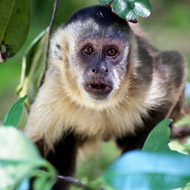
Finding prompts questions about influence of monkeys on human behaviour
Monkeys in Brazil have been using stone tools to crack open cashew nuts for around 700 years, according to new research.
Researchers say, to date, they have found the earliest archaeological examples of monkey tool use outside of Africa.
"Until now, the only archaeological record of pre-modern, non-human animal tool use comes from a study of three chimpanzee sites in Cote d’Ivoire in Africa, where tools were dated to between 4,300 and 1,300 years old," explains lead author Dr Michael Haslam.
"Here, we have new evidence that suggests monkeys and other primates out of Africa were also using tools for hundreds, possibly thousands of years. This is an exciting, unexplored area of scientific study that may even tell us about the possible influence of monkeys’ tool use on human behaviour."
In the study researchers observed groups of modern capuchins at Serra da Capivara National Park, Brazil. They watched the capuchins use stones as hand-held hammers to crack open cashew nuts, with young monkeys learning from older ones how to do the same.
The researchers then proceeded to excavate the site, digging to a depth of 0.7 metres, in an area close to the cashew trees where they observed the modern capuchins.
They identified the tools from inspecting the size and shape of the stones, as well as distinctive damage on the stone surface caused by capuchin pounding.
Through a technique called mass spectrometry, the researchers were able to confirm that dark-coloured residue on the tools was from cashew nuts.
They also carbon-dated small pieces of charcoal discovered with the stones to establish the oldest were least 600 to 700 years old, pre-dating the arrival of Europeans in the New World.
The study, pre-Columbian monkey tools, is published in the latest issue of Current Biology.



 The BSAVA has opened submissions for the BSAVA Clinical Research Abstracts 2026.
The BSAVA has opened submissions for the BSAVA Clinical Research Abstracts 2026.